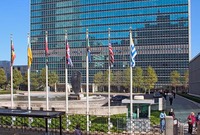Established in 1946 as the Speakers Research Committee for the United Nations, the Communications Coordination Committee for the United Nations, [CCCUN] is one of the oldest non-governmental organizations working with the United Nations. Its early work promoted an increased public understanding of the structure, objectives, and accomplishments of the U.N. For this purpose, our members have served as speakers in the general community and brought outstanding lecturers to the U.N, and in this way also provided a bridge between citizens and the United Nations.
The activities of the organization grew over the years and by the mid-1980s it was decided that the current name would be most appropriate. The purpose of the Communications Coordination Committee for the United Nations is to support the efforts of the U.N. and to cooperate with U.N. Agencies, other Non-Governmental Organizations (NGOs) accredited to the U.N., other non-profit enterprises, as well as other public and private institutions, by facilitating the use of effective communication methods and information for a peaceful, sustainable and high quality of life for all in the global community.
Conferences have been sponsored by CCCUN, often at the United Nations, dealing with various topics including: Communication for Global Unity; the Communication Revolution; the Global Brain; Meaning and Consciousness; and “World Environment Week” events, Cross Cutting Issues in Human Rights and Global Well-Being, and others. Speakers have included Sean McBride (Nobel Peace Laureate), David Bohm (Nobel Laureate in Physics), Buckminster Fuller, Peter Russell, Krishnamurti, Arthur C. Clarke, former U. N. Assistant-Secretary General Robert Muller, Ambassadors from various Missions to the United Nations and representatives of UN agencies, among others.
CCCUN’s projects have often been implemented by the work of sub-committees. They have included: the Global Communications System, of weekly satellite programs; the Human Glory Celebration, in support of the 1986 International Year of Peace; the Foundation for Global Broadcasting, providing satellite technology for public affairs programs to international audiences; the International Micro-Computer Education Project, including a pilot training program for computer literacy and management; Mobius Systems, development of an environmentally sound method for crop production on non-arable land; and the former monthly international printed and short-wave Global Student Voice, which engaged High School students in reviewing critical issues facing humanity. The United Nations subsequently put up their own on-line resource, the "CyberSchoolBus".
CCCUN has stimulated and supported the activities of other NGOs in support of many major U.N. Conferences including: Environment and Development, Disarmament, Law of the Sea, Women’s Rights, Social Development, Population and Development, Commission on the Status of Women, Habitat/Human Settlement as well as the planning and presentation of the annual United Nations Conference of Non-Governmental Organizations and the United Nations Millennium Peoples’ Forum. Most of our members also represent other NGOs in coalitions, such as the Campaign for a More Democratic United Nations (CAMDUN.), and the Global Peoples Assembly. Other projects included the Millennium Peoples Assembly Network (MPAN); Health & Sciences Council; the Global Youth Conferences Project, and expanded leadership training for civil society leaders in conjunction with other institutions. More recently, activities have focused on current pressing societal needs such as environment and sustainable development, health and well-being, social development, youth development and education, and democratic governance.
CCCUN continues to communicate regarding United Nations programs and helps promote interchange and activities among NGOs. We have been gratified to contribute to the growth and influence of civil society, greatly aided by information and communication technologies, in the service of local-to-global education and participation.
